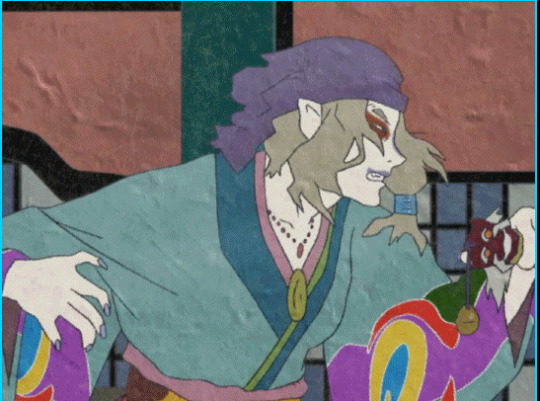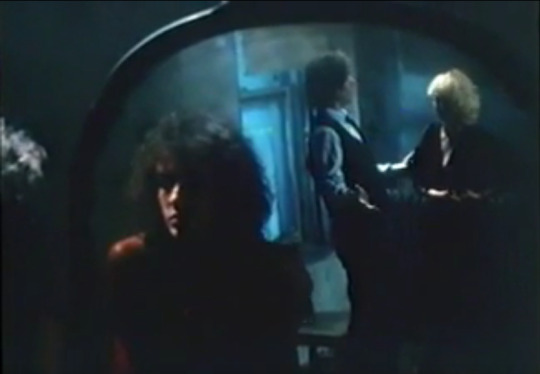#and i didn't really find any other frames that seemed to produce the same effect on a subsequent rewatch
Text

It's a new year
Time to post forbidden Kusu tiddie
#mononoke#ayakashi bakeneko#mononoke 2007#mononoke kusuriuri#imma be real this is probably just a weird frame in the animation and he's probably not actually meant to have tiddies#especially since hyper very clearly Does Not (depending on how connected you view them to be)#and i didn't really find any other frames that seemed to produce the same effect on a subsequent rewatch#but it would be wild if this turned out to like be an actual thing lol#anyway this is mostly shitposting#mostly
90 notes
·
View notes
Text
Put On Your Raincoats #24 | Midnight Heat (Watkins, 1983)

This review contains spoilers.
Roger Watkins' Midnight Heat opens with slow motion shots of Times Square in the winter. It's a drab, dismal sight, and the ominous music that plays over the footage sets the tone. A caption flashes onscreen. "Sex can become a weapon." It's a quote credited to Henry Miller. (Upon further Googling I suspect this might not be a real quote, but the movie had me fooled at the time.) We see Jamie Gillis, alone in a high rise apartment, looking contemplatively out the window. He receives a call about a job, which he accepts, albeit a little indignantly. There's a POV shot going down a corridor, bathed in atmospheric blue lighting, with occasional glimpses of a man in an office reading a newspaper. Gillis comes in through the door and pulls out of a gun. Freeze frame. The title flashes on the screen while a thunderous gunshot noise erupts on the soundtrack.
With these opening moments, Watkins introduces a level of violence and accompanying dread that hangs over the rest of the movie, wherein Gillis hides out in a seedy hotel, meditating over what led him to this moment. You see, Gillis is a hitman, and in his own image a pretty good one, but not one immune to making bad decisions. One of these bad decisions would be sleeping with the boss's wife. (In true mafia fashion, when the boss catches him, he plants a kiss firmly on his lips. "I'll be seeing you in the streets") Another bad decision would be porking the boss' daughter (with whom he was casually discussing T.S. Eliot) and then making a mid-coital phone call to let the boss know. But the OG of these bad decisions was what got him into his line of work in the first place, taking an ill-advised job after blowing a sizable amount of money at the track. You see, like the name of a certain Charles Bronson film series, Gillis both wishes death upon others (as part of his work) and has a death wish himself. "The more dangerous something is, the more we forget about everything else. Danger motivates people. Otherwise why bother."
But Gillis doesn't do this thinking all by himself. He has the company of a hooker, who perhaps is moved by Gillis, having encountered this form of professional violence in her personal life. And while there are genre expectations to be met, Gillis seems more interested in her company over anything else, perhaps to fill a void in his own life. They eventually reach a meeting of minds, even if it isn't terribly comforting to either one.
"You're afraid of dying aren't you."
"I haven't learned very much but I have learned on thing. Only someone in constant terror of of annihilation can experience life as it was meant to be experienced."
"And you're one of those men."
"Yes."
Watkins directed this the same year as Corruption, with which this shares Gillis in the starring role, cinematography by Larry Revene and a similarly fatalistic tone. I enjoyed the other movie quite a bit more, but I must admit at least some of that is due to the technical disparity of the versions I watched for each one. That one was on a snazzy Vinegar Syndrome Blu-ray, this one was on a blurry video-sourced transfer. In the other film, Revene does very precise things with underlighting and other techniques to create an oppressively chilly tone. Here I could grasp the impact of certain lighting and framing choices, but the low quality video image had a flattening effect on any precise flourishes present in the work. (One unintentional boon however was the way the dilapidated grey walls of the hotel room looked almost like fog thanks to the blurry transfer.) Even worse was the fact that the audio was just a bit out of sync, meaning that Watkins' more aggressive editing choices (switching between classical and porno-funk as he cuts between the street scenes and the sex) were thoroughly undermined.
Putting aside viewing conditions, I do think the other film is structured more engagingly so that the dread builds, although this one's inertia seems intentional, with the final moments driving home the purgatorial nature of the story. I think the other movie also bounces Gillis more effectively off of other characters (in particular, an almost demonic Bobby Astyr), whereas he only really has one person to play off here (Champagne, who I believe only has a few other credits, and whose IMDb page helpfully notes is not the same person as Phil Prince regular Cheri Champagne), although I did find her to be an intriguing screen presence. As for the sex scenes, Watkins had been frustrated that the ones in his earlier movies, which he delegated to producer Dave Darby, were too enjoyable for the raincoat brigade (despite making some very good films in the genre, he apparently didn't like it very much). I believe at this point (and certainly in Corruption), he'd taken over directing these scenes himself, although the effect is less consistent overall compared to the other movie. The flashback scenes are what I'd call conventionally enjoyable, despite the attempts to subvert them with cross-cutting, but the ones in the present are more potent, framed to have an isolating effect on the performers so that the sense of fatalism overrides any erotic impact. As for the climactic image, with Gillis' face contorted mid-thrust while the frame is flooded with red lighting, I appreciate the intention more than the end result. Anyway, I liked this less than the other films I've seen from Watkins and would like to see it in a better copy eventually, but it still has plenty of the qualities I enjoy about Watkins' work and is worth checking out if the idea of a hardcore mood piece tickles your fancy. And at less than seventy minutes, you can't lose.
1 note
·
View note